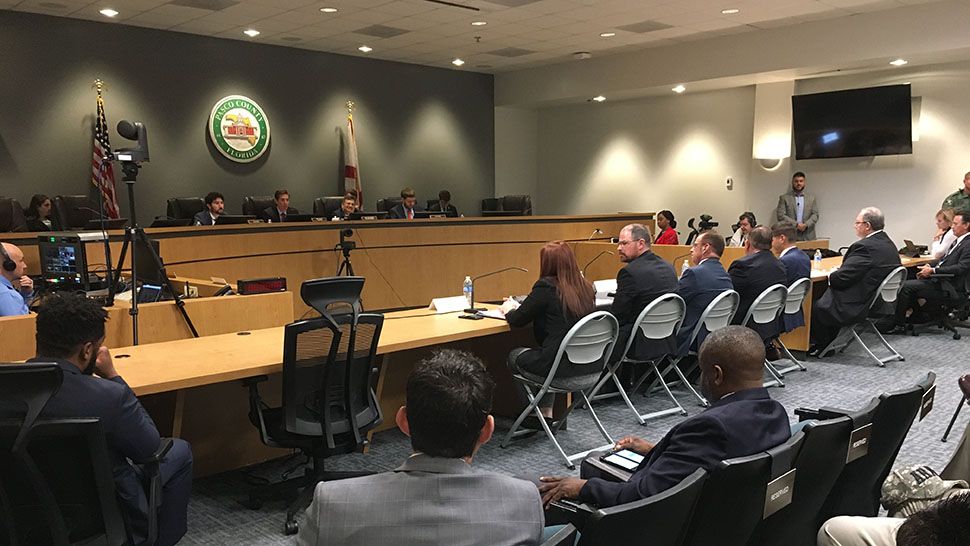NEW PORT RICHEY, FL – Members of the U.S. House of Representatives Veterans Affairs Committee held a public hearing Monday on veteran homelessness in Tampa Bay at the West Pasco Government Center.
- Subcommittee holds field hearings on veteran homelessness
- Florida has thousands of homeless veterans, data shows
- Lawmakers plan to put together veteran-focused legislation
It’s one of two field hearings the group’s subcommittee on Economic Opportunity held on the topic.
"It’s bringing attention that’s critically needed, particularly as it relates to affordable housing and many of the support services that our veterans require today. So, we’re just thrilled that they’re here," said Don Anderson, CEO of the Coalition for the Homeless of Pasco County.
Rep. Gus Bilirakis, the subcommittee’s ranking member, is credited with bringing the hearing to Pasco.
"We’re talking about hundreds of veterans in Florida who are homeless," Bilirakis said. "They have the HUD voucher, but it’s not enough. We have to increase that funding."
Among the panel that addressed the subcommittee was Danny Burgess, executive director of the Florida Department of Veterans’ Affairs. He told members that homelessness among veterans has been cut in half in Florida since 2011, thanks largely to national initiatives. Burgess’s written testimony also cited data from a Dept. of Housing and Urban Development point-in-time count conducted in January 2018, as well as a 2019 Council on Homelessness study.
He said they showed more than 2,500 veterans in the state are homeless.
One speaker told the subcommittee she was once among that number. U.S. Army Veteran Mary White said she was medically discharged after just more than a year of working as a military police officer.
"I always wanted to be either a police officer or join the military. So, when I got to combine them both, it was kind of the perfect outcome," White said.
White said her family’s two-parent household became a one-parent home dependent on her income, and she and her young son became homeless. With the help of a number of VA programs, White was able to get back on her feet. She told the subcommittee she’d like to see resources put toward areas crucial to veterans getting and keeping jobs.
"Transportation is a big barrier. Lack of actual good dental care is a very big barrier. There’s a lot of veterans who don’t have dental care. I mean, when somebody walks into an employer, the first thing they look at is a smile. So, it’s a big barrier to having a professional job and not having the correct smile to actually present yourself," White said.
David Lambert, chairman of the Pasco County Housing Authority, told members that his organization struggled to get financing for housing it plans to build for veterans and people with mental health issues.
"We have met resistance at every level," Lambert told the subcommittee. "This is based on the low funding from HUD through the federal budget and our balance sheet. Housing authorities are designed by nature to have a very slim margin."
Lambert said PCHA was requesting that the federal government create a regulation and funding source to help organizations like his get enough capital to obtain financing from private banks or federally backed loans.
Another panelist, Michael Raposa, CEO of St. Vincent de Paul CARES, requested advocacy from Congressional leaders when it comes to Florida’s affordable housing trust fund. He said the state continues to see that money put toward other uses by the state legislature. Anderson said it was a topic he was glad to hear brought up.
"We need to focus on that and make sure they understand that it’s only with those monies that we can begin to address affordable housing throughout the state of Florida," Anderson said.
Bilirakis and Subcommittee Chairman Rep. Mike Levin of CA said they planned to use what they learned at Monday’s hearing to put together a package of veteran-focused legislation to better serve those in need. Levin said part of what he’d like to focus on is stopping veterans from becoming homeless in the first place.
"If we can spend the money on prevention, we only have to spend about one tenth the amount of money as opposed to having to provide the wraparound services necessary once someone becomes homeless," Levin said.
A number of speakers noted there has been progress when it comes to curbing veteran homelessness in the state. Joe Battle, director of the James A. Haley Veterans’ Hospital, noted in his testimony that Tampa Bay’s overall homeless veteran numbers have decreased by 72 percent since 2011 according to 2018 PIT count data. Several at Monday’s hearing said they hoped the event could help those next steps toward progress move forward.



